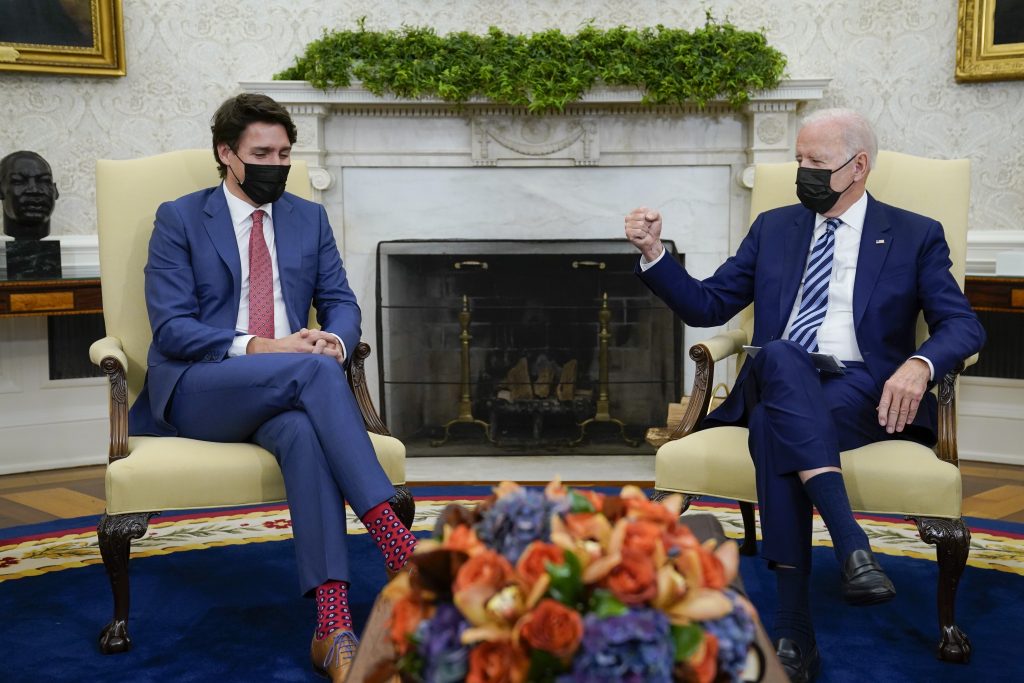Canada News
Two weeks after Trudeau visit, still time to push back on EV tax credit, Ng says

WASHINGTON — Canada still has “runway” to work with in its effort to prevent a proposed U.S. tax credit for electric vehicles from kneecapping the auto industry north of the border, International Trade Minister Mary Ng said Friday.
Ng was wrapping up several days of meetings on Capitol Hill with U.S. lawmakers who will eventually have to pass judgment on a central component of President Joe Biden’s legislative agenda.
That component, the Build Back Better bill, currently includes a juicy incentive for U.S. car buyers that would be worth up to $12,500 on vehicles made on American soil and built with union labour.
Many of the members of Congress who took part in the meetings said they’re still a long way from having decided how they’re going to vote, Ng said in an interview at the Canadian Embassy.
“There is still work to be done, (but) I would say that there is still runway,” she said.
“I heard from senators that they were not ready to vote on this, that they have work to be done. To me, that continues to therefore be an opportunity for Canada to keep doing this piece of work to find a solution.”
Ng led a multipartisan delegation of MPs, business leaders and union heads to the U.S. capital, just two weeks after taking part in Prime Minister Justin Trudeau’s visit to the White House, to raise and reiterate Canada’s concerns about a host of bilateral trade irritants.
Atop that list is the electric-vehicle tax credit, which for Biden is an important element of his strategy to address climate change, jump-start his country’s moribund manufacturing sector and create stable, good-paying jobs for working-class Americans.
Ng acknowledged that her meetings were more “granular” than the high-level discussions that took place in mid-November with Trudeau and Ng, as well as Deputy Prime Minister Chrystia Freeland, Foreign Affairs Minister Mélanie Joly and Public Safety Minister Marco Mendicino.
But like those meetings, the level of familiarity with Canada’s concerns ran the gamut, she said.
“I would say that in some of the meetings, I was doing a little bit of a briefing,” Ng said.
“Some had more knowledge, others had less, (but) there was receptivity to doing more work on their part and then continuing the conversation with Canada, which I think is really good. There was receptivity at finding solutions with Canada.”
Senate Majority Leader Chuck Schumer has made public declarations that he expects the Build Back Better bill to come to a vote before the Christmas break, but a number of key senators, including West Virginia Democrat Sen. Joe Manchin, have expressed skepticism about that timeline.
Manchin, whose vote will be critical in the evenly divided Senate, has in recent weeks expressed misgivings about the tax credit idea, in particular because Toyota is a major employer in his state.
These days, however, his concerns tend to revolve around the true price tag of the $1.75-trillion climate change and social spending package, as well as its potential effect on an inflation rate already topping six per cent.
The Canadian delegation included Conservative MP Randy Hoback, NDP counterpart Daniel Blaikie and Sébastien Lemire of the Bloc Québécois, as well as Flavio Volpe, president of the Automotive Parts Manufacturers’ Association.
Members of the delegation also raised concerns about the recent U.S. decision to nearly double duties on Canadian softwood lumber, as well as a threat to ban potato shipments from Prince Edward Island over concerns about evidence of a fungal outbreak.
“The face-to-face time was helpful,” Volpe said, waiting on the tarmac for his Toronto-bound flight to take off, before the seatbelt sign came on and he was forced to switch to text messaging.
“Every time we attend in person and lay out our concerns and offer co-operative alternatives, we remind them how important this is to us and impress upon them that we will have to react if they do this.”
The Team Canada approach, while effective politically at home, likely carries little weight with U.S. lawmakers, except on one important point, he added: “If it accomplishes anything, it might say there is no off-ramp for the U.S. if they screw Canada on this — we are all determined to defend the line.”
The legislation still has a long way to go in the Senate, including getting past the Byrd rule — a Senate reconciliation process that applies to budget bills and is designed to prevent extraneous spending provisions from finding their way into law.
Should the tax credit survive, challenges under the U.S.-Mexico-Canada Agreement — both Mexico and Canada have publicly said the proposal violates the letter and the spirit of the deal — would be likely, as well as other “retaliatory measures,” Volpe said.
For now, however, “diplomacy is always the best way to avoid a war, trade or otherwise.”
This report by The Canadian Press was first published Dec. 3, 2021.
James McCarten, The Canadian Press





















